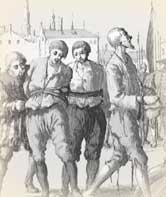
What was the surest way to make yourself unpopular in 1530? Join the Anabaptists.
Protestant and Catholic alike reviled these usually peaceable, Bible-loving souls and massacred large numbers of them. One group of Anabaptists (the name, given by their enemies, means "re-baptizers") came into being Jan 21, 1525 in Zurich when city authorities ordered two bible teachers, Conrad Grebel and Felix Manz to stop teaching interpretations of scripture that contradicted the city's officially approved doctrines. Believing that governments have no right to dictate religious beliefs, the stalwart pair persisted in teaching and in baptizing adult converts, even if they had been baptized as a child. Manz was soon drowned for his faith. Persecuted in Zurich, these Anabaptists fled to Moravia where they were kindly received.
In Moravia the Anabaptists found leadership from an unlikely source. Jakob Hutter, a hatter with little education, became head of a band of Anabaptists and taught them to share in common what they owned. Sharing was especially important at the time because many families had lost their providers in the trouble. Some were in prison for preaching without licenses. Others had been burnt at the stake and others drowned. Jakob Hutter brought stability to the group.
The Anabaptist position, already injured by the Peasants' War, worsened when a rebel group under the sway of Jan Matthijs tried to establish Christ's thousand year reign at Munster, Germany. Breaking with pacifist principles, the Munster Anabaptists fought government troops. Authorities besieged Munster, where a radical visionary named Jan of Leiden took control. Styling himself King David, he began to practice polygamy. The name Anabaptist took on new overtones of fanaticism because of this, although the majority remained the same peaceable people they had always been. King Ferdinand made no distinction, but ordered all Anabaptists rooted out. The peaceful folk fled into forests and hid in caves to save their lives.
Jakob Hutter and his wife Katherine Purst became hunted fugitives. Tracked down in the Tyrol, they were captured on this day, February 25, 1536. Their captors showed them no mercy, torturing them, whipping them, and immersing them in freezing water. Perhaps the water torture was designed to mock baptism.
Although local officials protested, persecutors, acting on Ferdinand's orders, doused Jacob with brandy and burned him. It appears Katherine was executed later.)
Years later, still oppressed, surviving Hutterites emigrated to the United States. Here they practiced a pacifist and communal lifestyle. Today thousands live in Canada, the United States, and Paraguay. Most still speak German.
Bibliography:
- "Anabaptists." The Oxford Dictionary of the Christian Church. Edited by F. L. Cross and E. A. Livingstone. Oxford, 1997.
- Littell, Franklin H. The Origins of Sectarian Protestantism. New York: Macmillan Co., 1964.
- Braght, Thielman J. Martyrs' Mirror, especially the chapter of George Blaurock and Hans Van der Reve. Translated by Joseph F. Sohm. Amsterdam, 1660.
- Wegner, John Christian. "The Heroic Witness of the Sixteenth Century Anabaptists." (www.bibleviews.com/evenuntodeath.html)
- Various encyclopedia and internet articles.